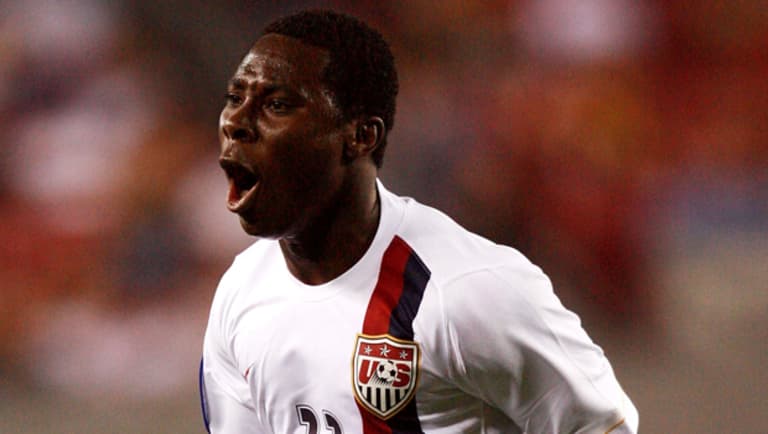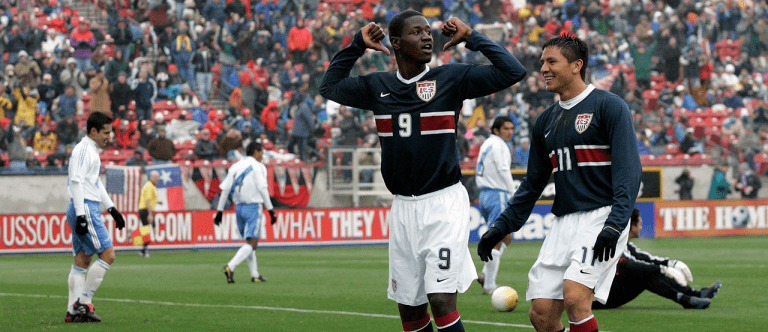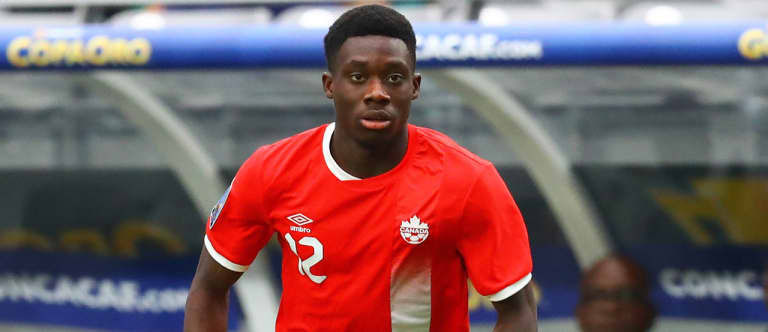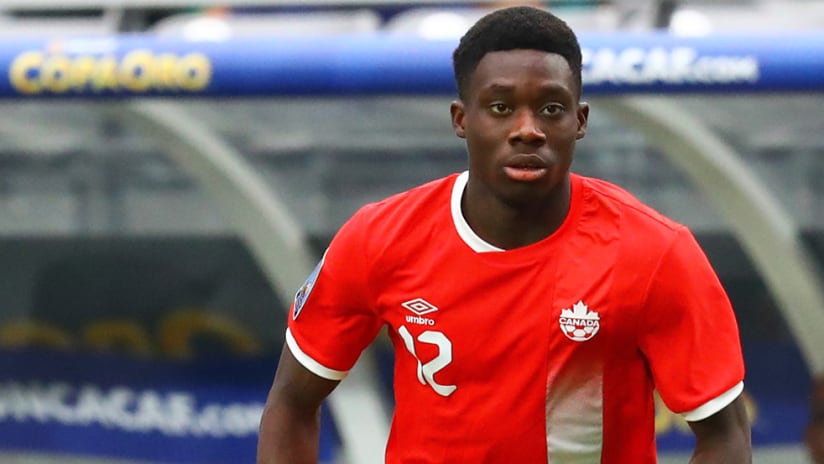Fifteen years ago, the 20 players on the US Under-20 national team knew they were in for new experiences when they arrived in the United Arab Emirates ahead of the 2003 FIFA World Youth Championship. After all, but a handful were college kids who had barely been out of the country, let alone to the Middle East.
But none expected to be shown up by a 14-year-old, last-minute addition to the squad.
After their first training session in Abu Dhabi, a swarm of reporters and cameramen rushed them as they were heading to the team bus. All the media wanted was a few minutes of Freddy Adu’s time.

Former US phenom Freddy Adu, celebrating a goal during Olympic qualifying in 2008. | USA TODAY Sports Images
Barely two weeks had gone by since Major League Soccer made the teen phenom from the D.C. suburbs the youngest signing in league history, and the hype machine had already started cranking. He was so talented, many of the stories said, he could become “the American Pelé” – that long-awaited breakout star American soccer had been chasing for years.
And in this moment, Adu’s teammates couldn’t understand why a kid five years younger than they were had the power to hold up their departure.
“I let him have a little moment,” recalls former longtime US U-20 coach Thomas Rongen, “but then I yelled, ‘Freddy, the bus is leaving in exactly one minute! If you’re not on it, we’re leaving without you.’”
As it turned out, that was the minute Adu was lost to The Machine. For all of his god-given gifts, Adu eventually drowned as the hype flooded and big money circled around him and anything and anyone in his orbit. Adu always had the talent, but somewhere along the way, the pathway to achievement became shrouded. The American Pelé he was not.
One has yet to surface. But countless other young phenoms have been put through The Machine: Bobby Convey. Santino Quaranta. Eddie Johnson. Jozy Altidore. Juan Agudelo. Those names and others saddled with the “Next Big Thing” mantle.
“We in the American soccer community put these guys on a pedestal and hang on them sky-high expectations they could never meet,” says Rongen, who came to love many of these players while coaching them in their youth. “And they bought into it. They loved the attention, and fame becomes the overriding factor – it’s bigger than the game. Our own culture created monsters.”
And that’s the honest truth. Thousands of players have marched through the American youth development system, but no matter how talented they are – and to be fair, many have been immensely talented – none has become that breakout star who sets the world on fire. Perhaps we only have ourselves to blame. We’re so insecure about our place in the game that we invest countless hours of passion into hoping someone will unearth that unicorn. And even if he shows a hint of becoming truly next-level, we can’t just back off and let him play.
This used to bother me to no end. How are we supposed to cultivate this sort of player when we’re crushing him with our own expectations before he can even prove himself? Why would we do such a disservice to a kid when our system is still far from perfect? In the past, I was first in line … to point the finger back at us.
I’m done with all that. With the United States missing the World Cup for the first time since 1986, and Canada chasing its first return trip since that same year, things have changed. There’s new hope with new talent, and the landscape has shifted. If we’re truly going to build one of these guys into our first real world-class superstar, he’s going to need to shoulder all of those expectations in order to come out the other side on top. That goes for guys like Christian Pulisic, FCD academy product Weston McKennie and Red Bulls Homegrown Tyler Adams in the US, as well as Vancouver Whitecaps speedster Alphonso Davies and former Orlando City SC man Cyle Larin across the border. The potential is still there. Let’s throw them into the fire and see what they’re made of.

Former US national teamer Eddie Johnson on the ascent in 2005. | USA TODAY Sports Images
Eddie Johnson remembers The Machine well. As a heat-seeking young striker from northeastern Florida, he earned plenty of attention in the mid-2000s for his innate scoring capability (Sports Illustrated once dubbed him “the Golden Child”). He used it as motivation, especially coming from a rough neighborhood and a background where he constantly had to prove himself. But even he admits today that he probably lacked the maturity to deal with all.
“The hype drove me,” he tells MLSsoccer.com from his home in Orlando, where he works in youth development. “I had a desire to want it more because of the lack of respect I felt they had abroad for Americans. But when things don’t go right even for one second – let’s say you’re hurt and not playing, or you see something about you on social media – all that negative stuff can start to play with your mind.”
So far, it doesn’t look like Pulisic is battling such mental gymnastics. At 19, he’s proven a lot of would-be doubters wrong: He’s already considered the best player on the US national team, and he’s a starter for one of the best clubs in Germany. Borussia Dortmund hasn’t coddled him, but it isn’t afraid of throwing him out there either: Pulisic does plenty of media appearances, and doesn’t seem to utter a single wrong word. He’s as polished as they come and seems to be able to handle the hype better than many who came before him. And in this age of instant feedback, he’ll hear it immediately if he makes an errant pass or puts in a subpar performance.

Canadian phenom Alphonso Davies has begun to step toward the expectations. | USA TODAY Sports Images
Canada’s insecurity runs a bit deeper. For every young phenom who wasn’t able to make that big next step, there’s also the disappointment of seeing a talented Canadian homegrown suiting up for another national team. So not only is it refreshing to see in Davies a kid who grew up in Canada staying with Canada (the irony isn’t lost on fans that he’s the first Canadian to be invited to train with Manchester United since Owen Hargreaves), there’s something a bit different about his game, too. He is – as Toronto FC Academy coach, TSN analyst and former Canadian national teamer Terry Dunfield says – “special.”
“He’s probably going to be dealing with the circus around them: Friends telling him how good he is, reading stuff saying he’s the next best thing, hearing about it on social media, listening to me talk about him,” says Dunfield, who himself dealt with high expectations after moving to Manchester City at age 15. “There’s a big responsibility on [the Whitecaps] and his family to keep him grounded. But that’s what Canada needs: a talented, young player who’s getting minutes and who you can build a team around. And he’s nowhere near his full potential yet.”
In the past, I argued piling on that hype was unfair. Part of the reason was I didn’t necessarily believe there existed enough infrastructure in place in the American and Canadian game to supply a young kid with the tools he needed: mental toughness to go with a technical skill set, a competitive environment, a solid support system and a clear pathway to club success at home or abroad. I no longer believe that to be the case.
“Everything is happening now,” Johnson says. “Soccer is mainstream here, and there’s more notoriety that goes along with it: There’s a chance to make some real money if you’re good enough. The expectations are what we always dreamed they’d be, and with that, the expectations on players comes at a younger age. Credit these guys like Pulisic, Davies, Larin and McKennie – they’re delivering.”
And that’s what it truly means to become a world-class player: You’ve got to be able to combine talent, work ethic and mental toughness in equal measures. You’ve got to be a complete player and not just rely on one part of your game, no matter how sublime it may be. And that means being able to take on those immense expectations and use them to push you forward, not hold you back. If you can’t handle it? Maybe you weren’t meant to become truly great in the first place.
As Dunfield puts it, “When you walk into stadiums of 50,000 people and you hear people talking about you, you have to have a little bit of that Cristiano Ronaldo arrogance.”
Dortmund may or may not have had their tongue planted firmly in cheek when they recently tweeted out a graphic comparing Pulisic’s early career with that of Ronaldo and Lionel Messi, but the point was made. The kid is special.
Look closer, and there’s a subtle subtext: No one ever implores fans in Portugal and Argentina to tone it down. Bring on The Machine.













